
International Journal of Electronic Security and Digital Forensics
Scope & Guideline
Illuminating the path to robust electronic security practices.
Introduction
Aims and Scopes
- Cybersecurity Innovations:
Focuses on advancements in cybersecurity technologies and methodologies, including machine learning, deep learning, and cryptographic techniques to enhance security measures against cyber threats. - Digital Forensics Techniques:
Explores methods and tools for digital forensic investigations, including mobile forensics, cloud forensics, and techniques for recovering and analyzing digital evidence. - Legal and Regulatory Frameworks:
Examines the evolving legal landscape surrounding digital security and forensics, addressing issues such as cybercrime legislation, data privacy, and the legal implications of emerging technologies. - Intrusion Detection and Prevention:
Investigates systems and protocols designed to detect and prevent unauthorized access or attacks on digital infrastructures, utilizing advanced detection algorithms and frameworks. - Emerging Technologies and Their Impact:
Analyzes the impact of emerging technologies such as IoT, blockchain, and AI on digital security and forensics, providing insights into their application and associated challenges.
Trending and Emerging
- Machine Learning and AI in Cybersecurity:
An increasing number of publications are exploring the application of machine learning and AI techniques for enhancing cybersecurity measures and automating forensic processes. - Cloud Computing and Forensics:
The intersection of cloud computing and digital forensics is gaining traction, with research focusing on the challenges and methodologies for conducting forensic investigations in cloud environments. - IoT Security Challenges:
As the Internet of Things continues to expand, there is a growing emphasis on the security challenges associated with IoT devices, including novel encryption methods and intrusion detection systems. - Data Privacy and Protection Laws:
Research is increasingly addressing the complexities of data privacy and protection laws, particularly in light of new regulations and their implications for digital security practices. - Adversarial Machine Learning:
Emerging studies on adversarial machine learning are focusing on threats to AI systems and developing strategies to enhance the robustness of security measures against such attacks.
Declining or Waning
- Traditional Forensic Methodologies:
Research focusing on conventional digital forensic methods is becoming less frequent, possibly due to the rapid development of new technologies and methodologies that offer more efficient and effective solutions. - General Cybercrime Studies:
Broad studies on cybercrime without a specific focus on technology or methodology are declining, as researchers are increasingly targeting niche areas or specific types of cyber threats. - Legal Frameworks in Specific Jurisdictions:
While legal considerations remain important, the focus on legal frameworks pertaining to specific countries or jurisdictions is waning in favor of more global or comparative legal analyses.
Similar Journals
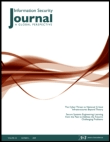
Information Security Journal
Elevating Standards in Computer Science Applications.The Information Security Journal, published by Taylor & Francis Inc, is a pioneering platform dedicated to disseminating knowledge in the realms of information security, computer science applications, and information systems management. With an ISSN of 1939-3555 and an E-ISSN of 1939-3547, this journal has successfully carved its niche within the Q2 quartile of the 2023 rankings for both Computer Science Applications and Information Systems and Management, while also being recognized in Q3 for the Software category. Located in the United Kingdom, the journal has been committed to advancing research and fostering innovation from 2008 through 2024, making it an essential resource for academics and professionals alike. With a significant Scopus ranking in its fields—placing 43rd out of 148 in Decision Sciences and 271st out of 817 in Computer Science Applications—the journal stands as a vital source of interdisciplinary insights. Although it does not currently offer open access options, the quality of publications and the journal's dedication to the field ensure that it remains a compelling choice for researchers seeking to publish their findings or stay abreast of current developments in information security.

Journal of Computer Virology and Hacking Techniques
Empowering Scholars in the Fight Against CybercrimeWelcome to the Journal of Computer Virology and Hacking Techniques, a prestigious academic publication dedicated to the evolving fields of cybersecurity and digital threats. Published by Springer France, this open-access journal has been at the forefront of disseminating high-quality research since its inception in 2014. With an increasing impact in areas such as computational theory, hardware architecture, and software security, the journal holds a significant position, classified in the Q2 and Q3 quartiles across several categories in 2023. The journal aims to provide a platform for researchers, professionals, and students to explore the latest advances in combatting cyber vulnerabilities and understanding hacking techniques. In alignment with its open-access policy, the journal ensures that knowledge is readily available to a global audience, reinforcing its mission to enhance the scholarly discourse surrounding computer virality while adhering to rigorous academic standards.
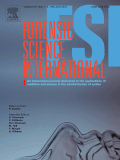
Forensic Science International
Advancing Forensic Knowledge for a Safer TomorrowForensic Science International is a premier journal published by Elsevier Ireland Ltd, dedicated to advancing the field of forensic science through interdisciplinary research and scholarship. Since its inception in 1978, this esteemed journal has provided a platform for vital research, receiving recognition in the Q1 category for both Law and Pathology and Forensic Medicine as of 2023, underscoring its significant impact in these domains. It currently ranks 54th out of 1025 journals in Social Sciences - Law and 51st out of 208 in Medicine - Pathology and Forensic Medicine, placing it in the top echelons of academic journals according to Scopus metrics. Forensic Science International transitioned to Open Access in 2019, ensuring that critical findings are widely available to the global research community and enhancing collaboration among forensic professionals. With a forward-looking scope that evolves to meet the challenges and innovations of forensic science, this journal remains a pivotal resource for researchers, practitioners, and students who are committed to the continued advancement of forensic science and its applications in legal contexts.
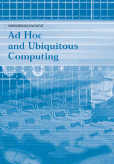
International Journal of Ad Hoc and Ubiquitous Computing
Pioneering Research in Networked SolutionsThe International Journal of Ad Hoc and Ubiquitous Computing, published by InderScience Enterprises Ltd, is a premier platform dedicated to advancing the fields of computer networks, communication systems, hardware, and software architecture. Since its inception in 2005, this journal has served as a critical resource for researchers, professionals, and students aiming to explore the intricate dynamics of ubiquitous computing and ad hoc networks. Though currently not an open-access journal, its scholarly contributions are well-recognized, as evidenced by its rank in the Scopus database, which places it within the lower quartiles of its respective categories. With an increasing focus on innovative solutions in computer science, the journal aims to facilitate knowledge dissemination and encourage interdisciplinary collaborations. Researchers are particularly drawn to the journal for its comprehensive coverage of emerging technologies, making it an invaluable asset in a world increasingly reliant on sophisticated communication infrastructures. As it continues to thrive towards 2024, the journal remains committed to fostering a vibrant academic community.

Journal of Digital Forensics Security and Law
Uncovering Truths in Cybersecurity and Forensics.Journal of Digital Forensics, Security and Law is a prominent open-access journal dedicated to the rapidly evolving fields of digital forensics, cybersecurity, and legal issues related to digital evidence. Published by the Association of Digital Forensics, Security & Law, the journal aims to create a central hub for researchers, practitioners, and educators to share knowledge, innovative methodologies, and the latest advancements in these interdisciplinary areas. With an ISSN of 1558-7215 and an E-ISSN of 1558-7223, this journal has been serving the academic community since 2013, providing unrestricted access to groundbreaking research that addresses the complexities of security and law in the digital age. The importance of this journal lies in its commitment to enhancing the understanding of legal frameworks and investigative techniques that safeguard digital assets while maintaining compliance with evolving regulations. Researchers, professionals, and students alike will find valuable insights and practical applications within its pages, contributing to the ongoing dialogue surrounding digital forensics and cybersecurity.

Future Internet
Connecting Ideas, Shaping Tomorrow's InternetFuture Internet is a leading open-access journal published by MDPI, dedicated to advancing the field of Internet technologies and communication networks. Since its inception in 2009, the journal has provided a platform for rigorous research and innovative ideas in the context of the rapidly evolving digital landscape. Based in Switzerland, it has established itself as a prominent publication, earning a commendable Q2 ranking in the category of Computer Networks and Communications for 2023. With a Scopus ranking of #87/395 and a notable 78th percentile, Future Internet fosters interdisciplinary collaboration, making valuable contributions to the understanding of Internet systems, protocols, and applications. Researchers, professionals, and students alike will find a wealth of insightful articles addressing both theoretical foundations and practical implementations. The open-access format ensures that all readers have immediate and unrestricted access to high-quality research, facilitating knowledge dissemination and informed decision-making in academia and industry alike.
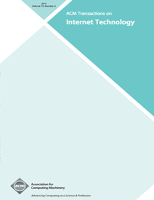
ACM Transactions on Internet Technology
Exploring Innovations in Digital ConnectivityACM Transactions on Internet Technology, ISSN 1533-5399 (E-ISSN 1557-6051), is a premier journal published by the Association for Computing Machinery (ACM) that has made significant contributions to the field of computer science, particularly in the areas of computer networks and communications. Established in 2001, this journal has swiftly ascended to a prestigious Q1 ranking in its category as of 2023, demonstrating its influence within the scientific community, evidenced by its high Scopus rank of #41 out of 395 journals and a remarkable 89th percentile ranking. The journal serves as a vital platform for researchers, professionals, and students, offering a spectrum of scholarly articles that explore advancements in Internet technology, design, applications, and performance. With a commitment to high-quality research, ACM Transactions on Internet Technology is dedicated to fostering knowledge exchange and innovative problem-solving in an ever-evolving technological landscape. Readers can look forward to insights into both theoretical frameworks and practical implementations, making it an essential resource for cutting-edge research and developments in the digital frontier.
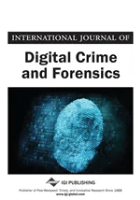
International Journal of Digital Crime and Forensics
Unveiling Insights into Cybersecurity and Forensic PracticesWelcome to the International Journal of Digital Crime and Forensics, an esteemed publication spearheaded by IGI Global, dedicated to advancing research and disseminating knowledge in the crucial fields of cybersecurity, digital crime, and forensic analysis. With its inaugural issue published in 2009, this journal has continually focused on providing a platform for innovative research, insightful case studies, and practical solutions aimed at addressing contemporary challenges in digital criminal activity and forensic investigation. While currently classified in the Q4 Category for software within the Computer Science domain according to 2023 rankings, and positioned in the 32nd percentile of Scopus Ranks, the journal remains committed to enhancing its impact and visibility in the scholarly community. By maintaining a rigorous peer-review process, the journal ensures high-quality contributions that equip researchers, professionals, and students with essential tools and knowledge. Although the journal operates under a subscription model, it plays an integral role in shaping the discourse surrounding digital crime and forensics, making it an indispensable resource for anyone serious about understanding and combating digital threats.
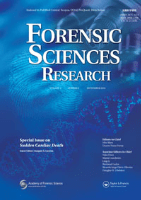
Forensic Sciences Research
Transforming Forensic Research into Practical SolutionsForensic Sciences Research is a distinguished open-access journal published by Oxford University Press, dedicated to the interdisciplinary field of forensic sciences. Since its inception in 2016, the journal has rapidly established itself as a vital resource for researchers, professionals, and students in areas including analytical chemistry, anthropology, biochemistry, genetic studies, and various branches of forensic medicine. With an impressive range of impact factor metrics across multiple categories—including Q1 rankings in Anthropology for 2023—this journal provides unparalleled access to high-quality research while facilitating the dissemination of innovative ideas and methodologies in forensic science. Researchers benefit from the journal's extensive Scopus ranking, which showcases its influential position within the academic community. The open-access model allows global accessibility, ensuring that vital forensic research reaches a diverse audience and contributes to advancements in public safety and legal processes. For those engaged in the practical realities of forensic investigation or the theoretical underpinnings of the field, Forensic Sciences Research is an indispensable journal that continues to advance knowledge and foster collaboration within the forensic community.

Journal of Cloud Computing-Advances Systems and Applications
Advancing Knowledge in Cloud ComputingThe Journal of Cloud Computing - Advances Systems and Applications, published by Springer, serves as a premier platform for disseminating cutting-edge research in the fields of cloud computing, computer networks, and software technologies. With an impressive impact factor and ranked in the top quartile for Computer Networks and Communications and Software categories in 2023, this open access journal has gained significant recognition within the academic community since its establishment in 2012. The journal not only provides valuable insights into innovative applications and advancements in cloud technologies but also supports collaboration among scholars, practitioners, and industry leaders. Operating from the vibrant hub of New York City, it boasts a robust international readership, ensuring that the latest findings reach a diverse audience. Authors and researchers are encouraged to engage with this vital resource, which is dedicated to exploring the transformative potential of cloud computing across multiple disciplines.